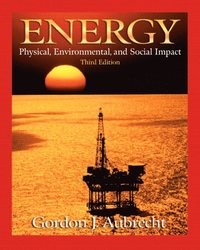
Kundrecensioner
Övrig information
Gordon Aubrecht is Professor of Physics at The Ohio State University at Marion. He has been a university professor for more than 25 years and has taught well over 200 undergraduate and graduate courses during his career. Gordon received his undergraduate degree in physics from Rutgers University. He did his doctoral work in theoretical particle physics at Princeton University, and did post docs at Ohio State and the University of Oregon. He was an Alexander von Humboldt Fellow at the University of Karlsruhe, Germany, and spent two years on leave at the University of Maryland and the American Association of Physics Teachers. His research (outside of energy issues) focuses on the understanding of physics by students using the tools of physics education research. He has published over 50 articles on his research in refereed journals and has made many contributions to books and encyclopedias. In addition to Energy, he is author or co-author of about a dozen other books, including Doing Physics with Spreadsheets (Prentice Hall, 2000), and The Charm of Strange Quarks (New York: Springer-Verlag, 2001). Gordon is a long-time member of many organizations, including the American Physical Society, the American Association of Physics Teachers, the National Science Teachers Association, the American Association of University Professors, the Institute of Electrical and Electronics Engineers, Phi Beta Kappa, and Sigma Xi. Gordon served as the scribe of the Citizens Advisory Council of the Utility Radiological Safety Board of Ohio until 2001. He is secretary of the InterAmerican Council on Physics Education, an organization dedicated to improving communication among physics teachers in the Americas. He is secretary of IEEE Standards Coordinating Committee 14. He is a founding member and current chair of the Contemporary Physics Education Project (CPEP). He has run almost four dozen local, national, and international workshops for high school and college teachers. Gordon is the recipient of numerous awards, including: the AAPT's Distinguished Service Citation (1996); Southern Ohio Section (AAPT)'s prestigious John B. Hart Award for distinguished service (2002); the Howard N. Maxwell Award for Distinguished Service by the Ohio Section, American Physical Society (2004); the Association for University Regional Campuses in Ohio (AURCO) Distinguished Service Award (2004); and the Ohio State Chapter of the American Association of University Professors Louis Nemzer Award for defending the principles of academic freedom against all challenges (2004). For many years, until its demise, Gordon had been a board member of the Delaware Recyclers, a nonprofit recycling organization in Delaware. He served six terms as president of that organization. As a result of his devoted work with the Recyclers, he was given the Lifetime Commitment to Recycling award by Keep Delaware County Beautiful in 1998. Gordon resides in Delaware (Ohio) with his wife Michelle and their daughters, Katarina and Taryn.
Innehållsförteckning
SECTION 1: INTRODUCTION TO ENERGY.
1. General Considerations.2. A Digression on the Necessity of a Finite World Population.
3. Work, Energy, and Power.
SECTION 2: ELECTRICITY GENERATION AND TRANSMISSION.
4. Electricity.5. Consumption of Electrical Energy: Projections and Exponential Growth.
SECTION 3: THERMAL ASPECTS OF ENERGY GENERATION.
6. Atoms and Chemical Energy.7. The Efficiency of Energy Generation and Thermodynamics.
8. Production and Distribution of Electricity.
9. Conservation: An Important Energy Source.
SECTION 4: MATERIAL RESOURCES AND CONSEQUENCES.
10. Mineral Resources.11. Recycling and Reuse.
SECTION 5: FOSSIL FUEL RESOURCES AND CONSEQUENCES.
12. Fossil Fuel Resources.13. Environmental Effects of Utility Generating Facilities.
14. Pollution from Fossil Fuels.
15. Moving Down the Road.
16. Weather and Climate.
17. Climate Change and Human Activity.
SECTION 6: NUCLEAR ENERGY RESOURCES AND CONSEQUENCES.
18. Nuclear Energy.19. Energy from Nuclear Reactors.
20. Safety and Nuclear Energy.
SECTION 7: SOLAR ENERGY.
21. Solar Energy.22. Solar Energy and Water.
23. Biomass Energy.
24. The Energy Cost of Agriculture (A Case Study).
SECTION 8: ENERGY ALTERNATIVES.
25. Energy Storage and Energy Alternatives.26. Tocsin.
Appendix 1: Scientific Notation.
Appendix 2: Logarithms.
Appendix 3: Understanding Tabular Data.
Appendix 4: Vector Addition.
Index.
